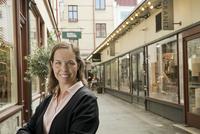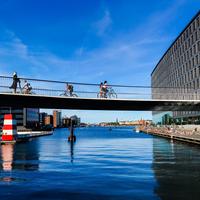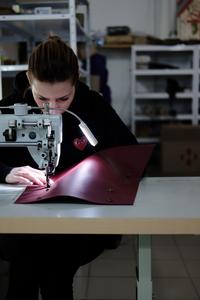
- "Europe's innovative cutting edge"
- Critical perspectives on sustainable city planning
- Drives and barriers in consumer behaviour
- Circular business = sustainable consumption?
- Perspectives on the consumption of clothes
- Representing at Almedalen
- Workshops, seminars and co-production
- Sharing Activities / Collaborative Economies
- Advocacy work regarding the suggestion of taxes on fashion
CCR:s research and outcomes of societal impact activities
The Centre for Consumption Research (CCR) is making the world a better place – project by project. In our research we are addressing some of today’s major challenges.
It is in line with the overall aim of CCR being a highly relevant research environment... /Niklas Sörum, Director of the Centre for Consumption Research (CCR)
Niklas Sörum, Director of the Centre for Consumption Research/CCR about the importance of recognizing societal impact from research conducted at CCR:
"This is an essential part of our research and CCR has a long tradition of working closely together with a number of stakeholders in order to provide research-based knowledge that could inform other organizations and actors than strictly academia or the scientific research community.
It is in line with the overall aim of CCR being a highly relevant research environment that not only observes or comments on society from a distance but also try to work for whatever improvements that our research experiences and results could enable. Obviously, being a relevant research environment could mean a number of different things and as a researcher you cannot always know how or for whom your research might be of relevance. It is very important not to narrow down or develop explicit rules for how researchers ought to communicate their results, detail specific formats for communication or trying to rank specific forms of engagements for research communication. Different research projects have different aims and ambitions, and as an interdisciplinary research environment we need to acknowledge such things."
Below you can find a handful of concrete impacts stemming of our research projects, collaborations and stakeholder engagements. Please, bear in mind that this is not a representative image of all of the research activities with high societal relevance at the center, nor are they ranked in any specific order in terms of relevance or other criteria:

"Europe's innovative cutting edge"
CCR, represented by Gabriella Wulff, has been part in project initiated by Region Västra Götaland with the vision to create: “Europe's innovative cutting edge and a nourishing environment for creative circular design in textiles and fashion”. The project resulted in a “Strategy for circular textiles and fashion Region Västra Götaland, Sweden”.

Critical perspectives on sustainable city planning
CCR, represented by Niklas Sörum and Helene Brembeck, presented critical perspectives on sustainable city planning, sustainable alterantive markets and cultural planning based on their research at Mistra Urban Futures (2010 - 2020). These projects were ongoing efforts aimed for and completing implemention of strategies, policies, practices and tools for a sustainable city through collaborations between CCR, Mistra Urban Futures, the local Cultural Administration’s Office in Gothenburg as well as City of Gothenburg and a number of actors involved in alternative markets/art/secondhand/commercial businesses

Drives and barriers in consumer behaviour
CCR, represented by Magdalena Petersson McIntyre and Elias Mellander, participated as in the project Sustainable wardrobes, looking to examine and disseminate information on drives and barriers in consumer behaviour to enable circular fashion economies. In addition to CFK, the project partners were the Swedish Consumer Agency, Region Västra Götaland, Science Park Borås and the project Re:textile.

Circular business = sustainable consumption?
CCR, represented by Gabriella Wulff, presented critical perspectives based on her research at a Forum organised by Agenda 2030 i Väst. The theme of the event was if investment in circular business lead to sustainable consumption.

Perspectives on the consumption of clothes
CCR, represented by Magdalena Petersson McIntyre and Elias Mellander, presented research and critical perspectives on the consumption of clothes at Textilsmart 2019, a campaign for spreading information about sustainable textiles, organised by the Swedish Environmental Protection Agency in collaboration with the Swedish Consumer Agency.

Representing at Almedalen
CCR, represented by Gabriella Wulff, has presented her research during Almedalsveckan 2021. This also resulted in a blogpost on Forskningomrea.com: ”Finns det en koppling mellan rea och cirkulär ekonomi?” (published 21.07.08).

Workshops, seminars and co-production
CCR, represented by Niklas Sörum and Helene Brembeck, has engaged in a number of workshops, seminars and collaborative co-production of materials for decision making and management information regarding development and implementation of Sustainability in Cultural Planning tools as well as Cultural Strategies in the local Cultural Administration’s Office in Gothenburg. Some of these events has been based on their research at Mistra Urban Futures (2010 - 2020).

Sharing Activities / Collaborative Economies
CCR, represented by Niklas Sörum, has engaged in a number of workshops, seminars and collaborative co-production of materials for decision making, practices, tools and management information regarding development and assessment of local and national Sharing Activities / Collaborative Economies as part of a strategic collaboration between CFK, the City of Gothenburg and Vinnova (2017 - 2021). Stakeholders: City of Gothenburg, Älvstreanden Utveckling, RiSE, University of Gothenburg, Coompanion, Kollaborativ Ekonomi Göteborg, Leksaksbiblioteket, Studiefrämjandet, Elof Hansson fastigheter, Riksbyggen, Klädoteket, Grow, NCC, Stena Fastigheter.

Advocacy work regarding the suggestion of taxes on fashion
CCR, represented by Gabriella Wulff, has engaged in advocacy work through feedback on a consultation from the Swedish government regarding the suggestion of taxes on fashion (SOU 2020:20). This also resulted in a blog posts on GRI-bloggen: “Förbjud skadliga kemikalier istället för att beskatta modet” (published 20.10.27)
